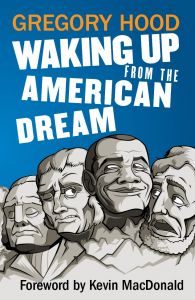CrowdStrike and the Gigantic

CrowdStrike CEO George Kurtz with retired basketball star Earvin “Magic” Johnson. (Image source: Twitter/X)
1,585 words
Every waking hour, every moment of the day, everywhere we look, whether it’s breakfast cereal boxes, pop-up advertising dross, or sportsball team group photos, we are bombarded by Diversity, Inclusion, and Equity — the DIE machine. It is so all-pervasive that we seemingly pay it no mind, but unconsciously we are alarmed by the presence of the hostile other. Even though it is in our faces all the time like a leering, ubiquitous transgender version of Big Brother — picture Michelle Obama posters the size of teetering skyscrapers — we often have the option of scrolling away, clicking to dismiss, or turning the channel. It is very difficult to relegate the dangers of DIE set-asides and affirmative action hiring sprees, however, when the plane we’re sitting in suddenly plummets from the sky.
Do you remember a few years ago when multiple engineering and construction firms tasked with building an overhead pedestrian walkway in Miami collapsed and killed multiple people? Well, if you don’t, you’ll probably have no trouble surmising the result: the overhead walkway first started falling over, and then it collapsed onto the motorway below. It turned out that some of the companies involved, including Florida International University itself, were less about the engineering part of the task and more about the diversity of its hires. In his article published at the time, Gregory Hood quite rightly concluded that there ought to have been an investigation into how affirmative action and ethnic networking jeopardize safety. The glaring implication is, of course it does.

You can buy Greg Hood’s Waking Up From the American Dream here.
In order to rid ourselves of the technological hell that we’re in, which has been infused with the potently destructive brew of diversity, what do we do? Preferential diversity hiring draws focus away from core competencies toward race and ethnicity. Perhaps more insidiously, though, the incompetence of diversity hires also serves as a way to deflect or distract from a deeper malevolence.
First, we draw attention to it. The world was recently preoccupied with the CrowdStrike fiasco that disrupted multiple systems across the globe, affecting millions of machines, from home computers to airline booking software.
Incompetence is a horrendous problem in situations such as these, but what about when these companies, such as CrowdStrike, are actively malign? What if it was a calculated attack to disrupt the Republican National Convention and prevent its attendees from flying home? Perhaps it was used to deflect from the assassination attempt on Donald Trump. With a company so aligned ideologically with the Democratic Party and Jewish interests, there’s a good chance that it wasn’t just an accidental software glitch.
Our genocidal overlords like to tout Diversity, Equity, and Inclusion (DEI) programs as the hallmark of neoliberal achievement; one that allows any number of unqualified non-white candidates the most responsibility. I prefer to use the DIE acronym instead. It’s just a way of intensifying the fact that we’re all rushing headlong to our premature deaths as a result of these programs.
CrowdStrike, a cybersecurity company, openly supports the diverse hiring of brown biomass candidates. It’s almost a given that corporations and public institutions that have an overt diversity and inclusion page, along with all sorts of policy documents that genuflect toward the Diversity gods, are not our friends. A page on CrowdStrike’s website entitled “Diversity, equity & inclusion at CrowdStrike” reads, in part, as follows:
At CrowdStrike, we are committed to fostering a culture of belonging where everyone feels seen, heard, valued for who they are and empowered to succeed. Our approach to cultivating a diverse, equitable, and inclusive culture is rooted in listening, learning and collective action. By embracing the diversity of our people, we achieve our best work and fuel innovation — generating the best possible outcomes for our customers and the communities they serve.
Any company that allows the core competencies of their organization to be relegated to secondary status in favor of diversity are playing with fire. This is what CrowdStrike’s Chief Human Resource Officer, J.C. Herrera, had to say:
We believe a diverse and equitable organization is key to our success and we have a deep commitment to listening and learning to become a stronger, more inclusive organization where our people feel a sense of belonging. In fact, innovating through inclusion is a big part of our values at CrowdStrike.
The CrowdStrike service outage that affected more than 8.5 million computers worldwide serves to remind us of the ubiquity of Microsoft products, as CrowdStrike is used throughout Microsoft systems. In a recent Revolver article, it was revealed that 85% of public service computer networks run on Microsoft, with a high concentration in the Pentagon itself. Interestingly, for those wondering about the political allegiances and leanings of that company, it turns out that they are — surprise, surprise — supporters of Kamala Harris and the Democratic Party. As Revolver’s anonymous author puts it: Microsoft is at the tip of the spear when it comes to Internet censorship now that Twitter/X is under Elon Musk’s control.
It would be very interesting indeed if a number of companies decided to stop preferential hiring and start hiring white guys again. If corporations — and even governments — could be shown that their productivity, profits, output, or whatever metric you choose had improved, there would be a push to do away with diversity initiatives altogether.
When speaking about modern society, Jonathan Bowden put it this way:
As we look around us in this society now, our people have an absence of belief. They’re very technically sophisticated. We still as a civilization bestride much of the rest of the world, like a sort of empty technological colossus. But if you peer inside, as to what we are supposed to believe, and account for, and what we think our destiny is individually and as a group, there’s a zero; there’s a nothingness; there’s a blank space for many people.
This is reminiscent of Martin Heidegger’s concept of “the gigantic” (das Riesige):
One of the most secret forms of the gigantic, and perhaps the oldest, is the tenacious skillfulness in calculating, hustling, and intermingling through which the worldlessness of Jewry is grounded.[1]

You can buy Greg Johnson’s Graduate School with Heidegger here
Greg Johnson explains:
Here Heidegger remarks on how diaspora Jewry, because of its rootlessness and predominantly commercial form of life is uniquely adapted to the conditions of modernity, which Heidegger characterizes by “worldlessness” and “the gigantic” (das Riesige). Heidegger believes that both meaning and measure are endowed by rootedness in a particular language, culture, and homeland. Rootlessness, therefore, leads to worldlessness (a void of meaning) and the gigantic (an abolition of limits; bigger is always better; new is always improved). Both worldlessness and the gigantic are forms of nihilism that are characteristic of modernity.[2]
Moreover, in his essay that examines Heidegger’s ethnonationalism, Greg Johnson again addresses the notion of the gigantic:
But the universal, homogeneous global state will be no utopia. What is the meaning of life for cosmopolitan-individualist-technological man? Basically to appropriate, transform, and consume nature. And doing so without measure leads to what Heidegger called “the gigantic” (das Riesige): the realm of exploding populations, of cities surging upwards, plunging downwards, and sprawling out in all directions — a world where the new is always improved and more is always better — a world where knowing that you can do something is equivalent to knowing that you should do it — a world of an ever-expanding humanoid biomass, throbbing, swarming, and pullulating over the globe — until, at last, we crash into objective limits that we refused to see and factor into our plans, and the earth becomes a scorched boneyard, in which some of the skeletons enjoyed the privilege of a long string of numbers in their bank accounts before the lights blinked out forever and the world returned to being just lifeless matter in space.[3]
It is interesting to note that the founder and Chief Executive Officer of CrowdStrike is one George Kurtz. Here, in part, is his biography on the CrowdStrike website:
George Kurtz is the CEO and founder of CrowdStrike, a leading provider of next-generation endpoint protection, threat intelligence, and services. Mr. Kurtz is an internationally recognized security expert, author, entrepreneur, and speaker. He has more than 30 years of experience in the security space, including extensive experience driving revenue growth and scaling organizations across the globe. His entrepreneurial background and ability to commercialize nascent technologies have enabled him to drive innovation to market throughout his career.
A 2022 news article in the Israeli business publication Globes reveals that Kurtz and CrowdStrike co-founder Dmitri Alperovitch are both Jewish:
CrowdStrike was established in Austin Texas by CEO George Kurtz, Dmitri Alperovitch and Gregg Marston. Kurtz, who is Jewish, frequently visits Israel and was here several weeks ago, probably to help put together the imminent acquisitions and investments in the country. Alperovitch, who is also Jewish, immigrated with his parents from the Soviet Union to Canada and from there to the US.
Dmitri Alperovitch left CrowdStrike in 2020 in order to co-found the Silverado Policy Accelerator, which officially began operations in February 2021. The “policy accelerator” euphemism is just another word for lobby or think tank.
While preferential hiring that takes expertise and resources away from the core competencies of institutions is an enormous problem, the prospect of the gigantic technological colossus that is the modern world being directed by Jewish nihilism is quite terrifying.
Notes
[1] As quoted in Greg Johnson, “Heidegger and the Jewish Question,” The Occidental Quarterly 20, no. 2 (Summer 2020): 12.
[2] Ibid., 12.
[3] See also Greg Johnson, “Heidegger & Ethnic Nationalism,” in Graduate School with Heidegger (San Francisco: Counter Currents, 2020), 119-120.



